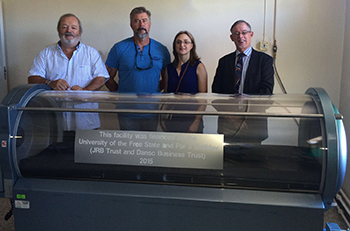Latest News Archive
Please select Category, Year, and then Month to display items
13 August 2024
|
Story Anthony Mthembu
|
Photo Sibahle Dayimani and Amandla Kulu
 Prof Peter Roseel, Managing Director of Management Consulting and Research – a spin-off of the Catholic University of Leuven in Belgium; and Prof Nicolene Barkhuizen, Director of the UFS Business School.
Prof Peter Roseel, Managing Director of Management Consulting and Research – a spin-off of the Catholic University of Leuven in Belgium; and Prof Nicolene Barkhuizen, Director of the UFS Business School.
The Business School at the University of the Free State (UFS) hosted Prof Peter Rosseel, Managing Director of Management Consulting and Research – a spin-off of the Catholic University of Leuven in Belgium – for a guest lecture during his visit to the UFS Faculty of Economic and Management Sciences (EMS).
The guest lecture took place on 19 July 2024 in the Business School Auditorium and was attended by academics from the UFS.
Reflecting on the lecture
The lecture presented by Prof Rosseel focused on how combining strategy, strategy implementation, culture transformation, leadership, and learning successfully leads to sustainable growth, creates engagement, and delivers tangible results. Throughout the lecture, Prof Rosseel spoke about how experts tend to make bad leaders and therefore stop change from happening within an organisation. In fact, he highlighted that, “Experts stop change from happening within the workplace because experts, by definition, look through the eyes of their expertise, but you cannot reduce the world to different forms of expertise, as it is holistic.” As such, he argued that to change an organisation, one must see things from the point of view of others.
Furthermore, Prof Rosseel delved deeper into the hierarchical operating model within organisations. He indicated that the above model should be one community within organisations; however, unfortunately it is not. This is because organisations are made up of several departments such as finance and human resources. As such, he regards these departments to be silos that could prove to be detrimental to organisations, as each silo can create its own culture as opposed to an organisational culture. These are some of the points he discussed throughout the lecture.
After the lecture concluded, the audience had the opportunity to engage with Prof Rosseel on his viewpoints. In fact, Lyle Markham, Academic Head of Department and Lecturer in Industrial Psychology at the UFS, was one of the audience members and described the lecture as insightful.
Department of Oncology provides hyperbaric chamber to cancer patients – a first in the Free State
2016-03-21

From the left: De Villiers Brink, Gys Botes (both of the Par3 Golfday group that donated towards the hyperbaric chamber), Dr Alicia Sheriff (Head of the UFS Department of Oncology) and Prof Gert van Zyl (Dean of the UFS Faculty of Health Sciences). |
Thanks to the Department of Oncology at the University of the Free State (UFS), cancer patients now have access to a hyperbaric chamber – a medical treatment that enhances the body’s healing process through the inhalation of oxygen.
In order to realise this tremendous addition to the treatment of cancer patients, the Department of Oncology established collaboration between the UFS School of Medicine, the Free State Department of Health, and a group of private donors. Currently the only one in the Free State, the hyperbaric chamber has been installed at the Oncology ward at National Hospital in Bloemfontein and will benefit not only patients from the Free State, but also the North West province and the Northern Cape.
While lying down in the chamber, the patient’s body absorbs more oxygen as a result of the high levels of air pressure. This process stimulates the healing of cancer wounds and various other injuries, including sports injuries.
Dr Alicia Sherriff, Head of the Department of Oncology (UFS), says her team is passionate about enhancing the quality of their patients’ lives, even when facing difficult circumstances. “I believe that the hyperbaric chamber is just one way of achieving this, since it helps decrease the harm done by certain medical conditions on the human body,” Dr Sherriff says.